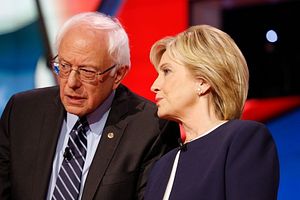The second Democratic presidential debate in Iowa highlighted substantial gaps in foreign policy knowledge and experience among candidates Hillary Clinton, Bernie Sanders and Martin O’Malley. Just 24 hours after the terrorist attacks in Paris, the debate underscored, more than ever, the critical importance of presidential leadership. Terrorism and the Middle East predictably dominated the first half hour of the debate. Specific discussion of the U.S. rebalance policy toward Asia was conspicuously absent – surprising given Clinton’s role as its chief champion. Although Clinton emerged to hold onto her heavyweight status as frontrunner and presumptive nominee, debate rivals amplified vulnerabilities in her foreign policy agenda as well as her positions on gun control, minimum wage reform and regulation of Wall Street.
We pose the same six questions on the implications of this second Democratic debate as we did in the fourth GOP debate last week assessing candidates’ substance, style and stamina.
Who most clearly articulated a vision of U.S. foreign policy?
Hillary Clinton – former secretary of state, senator and first lady – pulled rank as the candidate with the most impressive foreign policy chops. Given her bona fides, she should have completely dominated rivals in this segment of the debate. Instead, she stumbled in defending her record of underestimating the spread of ISIS, and was confused about the Authorization for Use of Military Force (AUMF) for terrorism vs the Iraq resolution. Her decision to invoke September 11 as rationale for accepting donations from Wall Street generated viral blowback in Twittersphere. Former Maryland Governor Martin O’Malley had a shining moment recounting a campaign trail episode of meeting a service member’s mother who implored the candidates not to use the phrase “boots on the ground” to demean the honorable service of military men and women. O’Malley wrangled with Clinton over the rhetoric of U.S. leadership in the fight against ISIS, stating it should be “America’s fight” but his vision of collaboration essentially converges with Clinton’s and Sanders’. Vermont Senator Bernie Sanders delivered an anemic performance starting with a pivot away from an opening statement that should have addressed the Paris attacks and explained candidates’ world vision. He instead prescribed his remedy of political revolution to cure global social and economic woes. He followed up later expounding his world outlook with an inexplicably bizarre claim that “climate change is directly related to the growth of terrorism.”
Although the three candidates agreed on deploying multilateral efforts against terrorism, they offered incomplete visions of how to defeat Islamic State. When asked if the United States is at war with radical Islam, the candidates avoided reference to Islam, opting instead for their own labels – “we’re at war with jihadists, barbarism and nihilism” (Clinton); “the term ‘radical Islam’ is not important (Sanders); and “radical jihadi” (O’Malley). Candidates’ inability to name the enemy raises questions about their ability to discern the source and scale of the threat.
Who played the China card?
Clinton mentioned China in a five-second reference at the end of the foreign policy segment, “We’ve got challenges in the South China Sea because of what China is doing in building up these military installations.” Clinton’s lack of clarity on the administration’s recent Freedom of Navigation (FON) exercises in the South China Sea and on opting for continued diplomacy with China reinforced her default mode of political ambiguity. The absence of any reference to cyber security threats was a glaring gap. Though Clinton acknowledged China and Russia as geopolitical challenges for the United States, she missed an opportunity to segue from combating global terrorism into engaging China, India and Russia to defeat Islamic jihadist threats across Asia.
Was the U.S. role in Asia sufficiently explained?
Departing from the first Democratic debate, candidates on Saturday opted not to address the Obama administration’s policy pivot to Asia and its cornerstone economic component, the Trans-Pacific Partnership (TPP) trade agreement. The current delay in its legislative review highly compromises its passage while most Americans agree that the TPP benefits the United States. As President Barack Obama participates in the Asia-Pacific Economic Cooperation (APEC) summit in the Philippines this week, the candidates’ omission of TPP discussion projects little reassurance of U.S. intentions to bolster strategic engagement in the region.
Whose stature appeared the most, least and mediocre presidential?
Criteria for presidential stature include 1) adeptly demonstrating policy prowess, 2) succinctly communicating complex ideas, 3) articulating U.S. global leadership and national future, 4) inspiring confidence and trustworthiness, and 5) effectively engaging the Democratic base. We rate the candidates below:
Most: Hillary Clinton
Mediocre: Martin O’Malley
Least: Bernie Sanders
What messaging strategies were effective?
Candidates stayed on message for much of the debate. Lapses in their rebuttals to controversial issues, however, accentuated each candidate’s weaknesses. Clinton attacked to the GOP to deflect doubt surrounding her judgment in the email server controversy. Sanders circumvented geopolitical reality by applying his panacea of “political revolution” to all policy challenges from terrorism to income inequality. O’Malley played up his executive management skills to compensate for lack of foreign policy savvy and time-tested crisis leadership experience.
Looking ahead, what approaches could further differentiate candidates in future debates?
With the first caucuses and primaries quickly approaching, Clinton will face increased scrutiny by her nomination rivals and the Republican field of contenders. Clinton is expected to further clarify her policy flip-flops including the TPP and the larger picture of whether she would sustain or recalibrate U.S. rebalance to Asia. All presidential candidates will enrich future debates and enhance the electoral process by cutting through the rhetoric and explaining the reality of how Asia’s geopolitical landscape impacts U.S. vital interests.
Mercy A. Kuo is an advisory board member of CHINADebate and was previously director of the Southeast Asia Studies and Strategic Asia Programs at the National Bureau of Asian Research. Angie O. Tang is Senior Advisor of Asia Value Advisors, a leading venture philanthropy advisory firm based in Hong Kong.

































